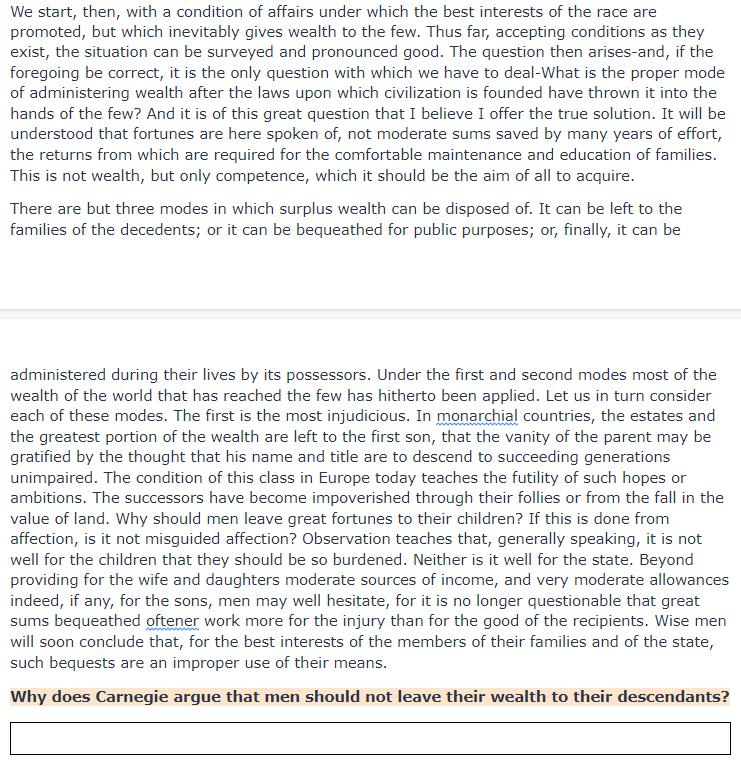Answered step by step
Verified Expert Solution
Question
1 Approved Answer
We start, then, with a condition of affairs under which the best interests of the race are promoted, but which inevitably gives wealth to

We start, then, with a condition of affairs under which the best interests of the race are promoted, but which inevitably gives wealth to the few. Thus far, accepting conditions as they exist, the situation can be surveyed and pronounced good. The question then arises-and, if the foregoing be correct, it is the only question with which we have to deal-What is the proper mode of administering wealth after the laws upon which civilization is founded have thrown it into the hands of the few? And it is of this great question that I believe I offer the true solution. It will be understood that fortunes are here spoken of, not moderate sums saved by many years of effort, the returns from which are required for the comfortable maintenance and education of families. This is not wealth, but only competence, which it should be the aim of all to acquire. There are but three modes in which surplus wealth can be disposed of. It can be left to the families of the decedents; or it can be bequeathed for public purposes; or, finally, it can be administered during their lives by its possessors. Under the first and second modes most of the wealth of the world that has reached the few has hitherto been applied. Let us in turn consider each of these modes. The first is the most injudicious. In monarchial countries, the estates and the greatest portion of the wealth are left to the first son, that the vanity of the parent may be gratified by the thought that his name and title are to descend to succeeding generations unimpaired. The condition of this class in Europe today teaches the futility of such hopes or ambitions. The successors have become impoverished through their follies or from the fall in the value of land. Why should men leave great fortunes to their children? If this is done from affection, is it not misguided affection? Observation teaches that, generally speaking, it is not well for the children that they should be so burdened. Neither is it well for the state. Beyond providing for the wife and daughters moderate sources of income, and very moderate allowances indeed, if any, for the sons, men may well hesitate, for it is no longer questionable that great sums bequeathed oftener work more for the injury than for the good of the recipients. Wise men will soon conclude that, for the best interests of the members of their families and of the state, such bequests are an improper use of their means. Why does Carnegie argue that men should not leave their wealth to their descendants?
Step by Step Solution
★★★★★
3.28 Rating (148 Votes )
There are 3 Steps involved in it
Step: 1
Carnegie argues that men should not leave their wealth to their descendants for several reasons 1 In...
Get Instant Access to Expert-Tailored Solutions
See step-by-step solutions with expert insights and AI powered tools for academic success
Step: 2

Step: 3

Ace Your Homework with AI
Get the answers you need in no time with our AI-driven, step-by-step assistance
Get Started


